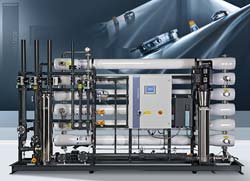Siemens launching ultra-economical reverse osmosis system into European market

The new Vantage M83 RO system's main benefit is low cost of ownership. The use of energy-efficient components, combined with flexible modes of operation, contribute to minimizing operating costs. The Vantage M83 RO system is designed for a wide range of industrial applications in such fields as the food and beverage, power, microelectronics and solar industries.
The Vantage M83 RO system from the Siemens Industry Automation Division is a compact RO system suitable for use in a wide range of applications. The system requires a footprint of just 82.5 x 429.5 cm and has a height of 237.8 cm, which allows it to fit through standard doorways of industrial buildings. It can be used for the production of process and boiler feed water as well as for wastewater and process water recycling. A distinguishing benefit of the system is its low total cost of ownership. Key factors influencing economical operation include low energy consumption by utilizing variable frequency drive (VFD) controlled feed pumps, resulting in potential energy savings ranging from 15 up to 60 percent compared to conventional in-line starter controlled pumps. Further benefits include enhanced water recovery and a streamlined chemical cleaning process. Unnecessary water consumption can be avoided by modifying system settings during startup, standby, and shutdown conditions that reduce waste without jeopardizing product water quality. Other benefits include simple system commissioning and user-friendly touchscreen controls with operational trending displays for monitoring system performance.
In Europe, the Vantage M83 RO units are available in three equipment models: Economy, Deluxe and Select. Each unit is a single-pass RO system mounted on an industrial coated structural steel frame or a stainless steel frame for the Select package. The RO unit includes a cartridge filter, high pressure feed pump, fiberglass reinforced plastic (FRP) side-entry pressure vessels and spiral-wound thin film composite RO membranes.
All system models are controlled by a programmable logic controller (PLC) with a color touchscreen Human-Machine Interface. The Deluxe and Select models include a VFD-controlled feed pump to save energy with flexible flow demand and an integrated CIP system to facilitate ease of cleaning without additional equipment. The Vantage M83 RO system's components are designed in such a way to provide easy access for servicing, maintenance, and monitoring system performance. Vantage medium pressure (MPR) membranes are provided as standard for ease of maintenance. Optional Vantage low pressure (LPR) membranes are offered to provide energy savings for cold water applications.
The systems are pre-engineered and pre-assembled to help minimize installation and startup costs. They are fully tested at the factory, require simple utility connections and, with minor setup and adjustment, are ready for immediate on-line service.
More information is available for journalists about Siemens' products and related topics featured at IFAT Entsorga 2012 on our website at www.siemens.com/press/ifat
For visitors and anyone interested in finding out more about Siemens' presentation at IFAT Entsorga 2012, information is available on our website at www.siemens.com/ifat
The Siemens Industry Sector (Erlangen, Germany) is the world's leading supplier of innovative and environmentally friendly products and solutions for industrial customers. With end-to-end automation technology and industrial software, solid vertical-market expertise, and technology-based services, the Sector enhances its customers' productivity, efficiency, and flexibility. With a global workforce of more than 100,000 employees, the Industry Sector comprises the Divisions Industry Automation, Drive Technologies and Customer Services as well as the Business Unit Metals Technologies. For more information, visit http://www.siemens.com/industry
The Siemens Industry Automation Division (Nuremberg, Germany) supports the entire value chain of its industrial customers – from product design to production and services – with an unmatched combination of automation technology, industrial control technology, and industrial software. With its software solutions, the Division can shorten the time-to-market of new products by up to 50 percent. Industry Automation comprises five Business Units: Industrial Automation Systems, Control Components and Systems Engineering, Sensors and Communications, Siemens PLM Software, and Water Technologies. For more information, visit http://www.siemens.com/industryautomation
Reference Number: IIA2012042824e
Contact
Mr. Peter Jefimiec
Industry Automation Division
Siemens AG
Gleiwitzerstr. 555
90475 Nuremberg
Germany
Tel: +49 (911) 895-7975
peter.jefimiec@siemens.com
Contact USA
Ms. Allison Britt
Water Technologies Business Unit
Siemens Industry, Inc.
2501 N. Barrington Rd.
Hoffman Estates
IL 60192
USA
Tel: +1 (847) 713-8477
allison.britt@siemens.com
Media Contact
More Information:
http://www.siemens.com/waterAll latest news from the category: Machine Engineering
Machine engineering is one of Germany’s key industries. The importance of this segment has led to the creation of new university degree programs in fields such as production and logistics, process engineering, vehicle/automotive engineering, production engineering and aerospace engineering among others.
innovations-report offers informative reports and articles covering technologies such as automation, motion, power train, energy, conveyor, plastics, lightweight construction, logistics/warehousing, measurement systems, machine tools and control engineering.
Newest articles

Largest magnetic anisotropy of a molecule measured at BESSY II
At the Berlin synchrotron radiation source BESSY II, the largest magnetic anisotropy of a single molecule ever measured experimentally has been determined. The larger this anisotropy is, the better a…

Breaking boundaries: Researchers isolate quantum coherence in classical light systems
LSU quantum researchers uncover hidden quantum behaviors within classical light, which could make quantum technologies robust. Understanding the boundary between classical and quantum physics has long been a central question…

MRI-first strategy for prostate cancer detection proves to be safe
Active monitoring is a sufficiently safe option when prostate MRI findings are negative. There are several strategies for the early detection of prostate cancer. The first step is often a…



